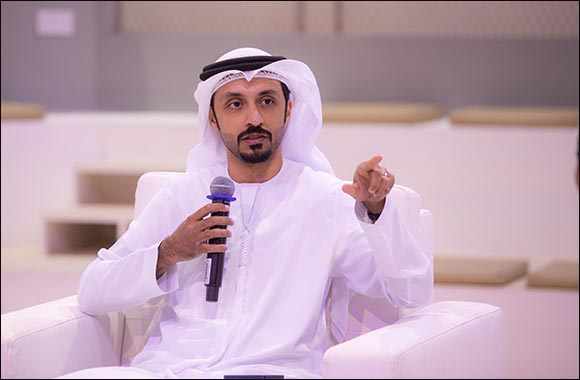Print books or audiobooks? This has been a hotly debated topic for years and was up for debate at the 14th Sharjah Children’s Reading Festival taking place at Expo Centre. Publishing industry stalwarts and an audiobook narrator discussed the merits of one over the other, whether audiobooks are more appealing to younger generations and how they will evolve in the future.
Yasmina Jraissati, literary agent and audiobook/eBook streaming service Storytel’s MENA publishing head, Annie Oswald, the vice president of books and audio for coaching company FranklinCovey and Ahmed Altamimi, an Emirati voice actor and audiobook narrator, weighed the pros and cons of audiobooks and how they are shaping the reading landscape, at a festival panel. “Audiobooks are yet to take off in a big way in the Arab region, but have grown in other places to such an extent that it has overshot sales of print books. But it has a lot of potential here and Arabic language works can benefit greatly from it,” said Jraissati. Altamimi agreed that “it is now easier than reading books, as you can listen to audiobooks anywhere, in the car or the gym or whatever you are doing.”
In terms of generational appeal, Oswald said: “Youngsters listen to a lot of audio, but not necessarily audiobooks, rather podcasts, music and stuff. Generation Alpha is going to be the market for audiobooks more than Gen Z, as their parents spend much more time listening to it in the car. So the popularity of audiobooks is going to skip a generation from Z to Alpha.” Selling CDs packaged with books has long been in practice, but today’s kids have changed, noted Jraissati. “They watch Netflix and play videogames and our way of catering to kids is still stuck with cartoons from 20 years ago, but they expect a differect kind of content today.”
Audiobook narrators play a key role too, she said. “Listeners may dislike the content but like the voice or vice versa. With Arabic content, we’re facing a lot of challenges, as many narrators do not have the linguistic capacity, or the translation is inaccurate, so listeners reject the book.”
While the success of audiobooks can be measured in sales according to Oswald, or engagement and reaching a niche community with specialised works as per Jraissati, Altamimi - as a voice artist - points out that narrators can make all the difference. “How is it recorded, what is the tone used in narration? It’s important to present the book in a way they can use and engage with. Sometimes, it’s a summary or brief version of the work that does well. As a storyteller, I would like the book to be covered fully but the end choice is that of the reader’s,” he said.
Abridged or condensed versions have always been around and are key to driving the success of audiobooks, noted Jraissati. “Especially for young children, middle graders and early teens. It can help lead them into complex content, mature and longer books. But for kids, the key is engagement. They need to be enthralled by the story. My son, for instance, took well to it at the start of the Covid-19 pandemic, when he was 4. He started listening to audiobooks and now has them on in the background all the time and listens to books targeted at an older crowd.”
This leads to the positives and negatives of audiobooks for children: while they may become less inclined to read a printed book, because they can listen to it instead, it can also help transition them into the world of literature, say the panellists. “It can make them lazy to actually read, to decipher the phonics, grammar and the beauty of the language. But audio books also expand their vocabulary exponentially. My son is now obsessed with stories. Thus, the positives outbalance the negative honestly,” said Jraisatti.
Oswald noted that we tend to forget that oral storytelling has existed since the start of humanity and that reading is actually the relatively new way of consuming content. “Evolutionarily, we listened to stories. Also, for children who are dyslexic or have other learning disabilities, audiobooks can be a boon,” she said.
While kids can access thousands of books on one device, it can also be a source of distraction, said Altamimi. “Yet, it can be hard to force children to read, so it’s often a better idea to get them to listen or watch a video that narrates the story. There are YouTube channels now that read out whole books,” he said. Non-fiction audiobooks are also easier to listen to than fiction which has storylines and character arcs which are better enjoyed on the pages, pointed out Jraisatti.
The professionals agreed that there is no danger of audiobooks ever replacing printed books. “The listening vs reading debate will rage on. But I expect children will need to start with audiobooks when he or she cannot read yet,” said Altamimi. Oswald said: “I want to insist that listening and reading really go together. We are storytelling beings, so giving children options is the best thing you can do. As long as you can keep them curious, that’s what matters.” Neither will audiobooks take away from the tangible, experiential feel of visiting bookstores, holding a book and smelling the pages, she says, something which has not been replicated by audiobooks, added Jraissati.
Yet, the way audiobooks are produced will get enriched over time, said Altamimi. “Stories may be dramatised in a better way, with sound effects etc,” he said. “There is a demand for this globally and in this region,” said Oswald.













